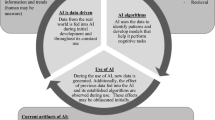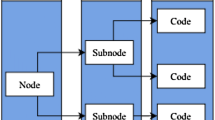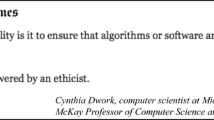Abstract
Computer and information ethics, as well as other fields of applied ethics, need ethical theories which coherently unify deontological and consequentialist aspects of ethical analysis. The proposed theory of just consequentialism emphasizes consequences of policies within the constraints of justice. This makes just consequentialism a practical and theoretically sound approach to ethical problems of computer and information ethics.
Similar content being viewed by others
References
Bernard Gert. Morality: Its Nature and Justification. Oxford, Oxford University Press, 1998.
Bernard Gert. Common Morality and Computing. Ethics and Information Technology 1(1): 57–64, 1999.
James H. Moor. What Is Computer Ethics? Metaphilosophy 16(4): 266–275, 1985.
James H. Moor. Reason, Relativity, and Responsibility in Computer Ethics. Computers & Society 28(1): 14–21, 1998.
Helen Nissenbaum. Should I Copy My Neighbor's Software? Deborah G. Johnson and Helen Nissenbaum, editors, Computers, Ethics, and Social Values, Englewood, New Jersey, Prentice-Hall, pp. 201–213, 1995.
John Rawls. A Theory of Justice. Cambridge, Massachusetts, Harvard University Press, 1971.
Author information
Authors and Affiliations
Rights and permissions
About this article
Cite this article
Moor, J.H. Just consequentialism and computing. Ethics and Information Technology 1, 61–65 (1999). https://doi.org/10.1023/A:1010078828842
Issue Date:
DOI: https://doi.org/10.1023/A:1010078828842




